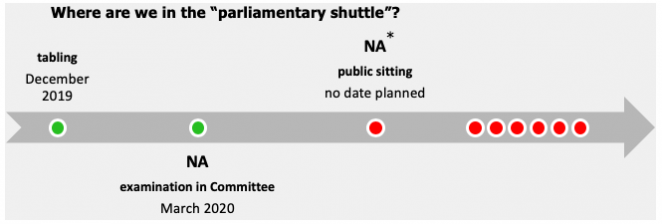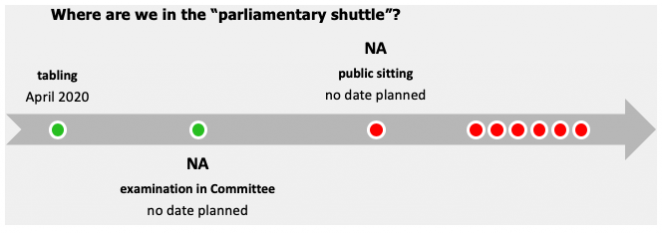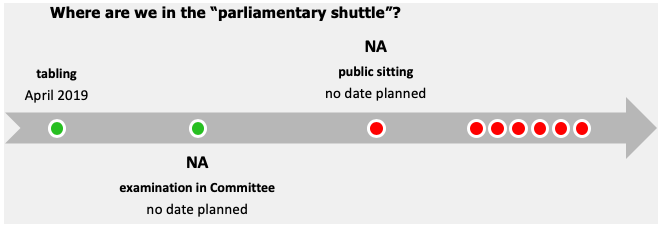2020/06 > An overview of French Parliamentary activity on IP Issues
A very broad range of subjects relating to intellectual property is currently under discussion by Parliament.
Regarding the audiovisual sector
The much-awaited reform of the audiovisual sector, which was due to come into force this summer, seems to be one of the many collateral victims of the coronavirus crisis. This bill, important in terms of its content – 82 articles, i.e. two or three times as many articles in the final text, fundamental changes for the state-owned audiovisual sector—should have been examined by the National Assembly by the end of March. It has been postponed sine die, and no date has been set neither in the National Assembly nor in the Senate.
As a consequence of this bill, law n° 86–1067 of 30 September 1986 concerning Freedom of Communication was radically overhauled and updated to reflect the upheavals brought about by the development of digital technology. It also included the transposition of two important aspects of Directive (EU) n° 2019/790 (copyright and related rights in the digital market) as well as the Government’s authorization to transpose Directive (EU) 2019/789 (copyright and related rights applicable to certain online transmissions of broadcasting organizations and retransmissions of television and radio programmes).
The bill also approved the merger of the regulatory bodies HADOPI and the CSA into a new authority, the Autorité de Régulation de la Communication Audiovisuelle et Numérique (ARCOM), and the creation of a new holding company bringing together INA, Radio France, France Télévisions and France Médias Monde.
The bill further aimed at strengthening the fight against counterfeiting on the Internet. HADOPI’s missions were reinforced and transferred to ARCOM. Finally, in order to fight against illegal streaming of sports events, the text provided for the entry of a particular summary proceedings into the sports code.

*NA=National Assembly
Regarding copyright
A bill from the political party Les Républicains to strengthen the fight against piracy of works protected by copyright was tabled in the National Assembly on 28 April.
This bill, as the author mentions in his explanatory memorandum, establishes in its single article a “criminal transaction mechanism in the fight against piracy and the plundering of protected works, aiming at strengthening the legal arsenal for this purpose”.
This text has only been tabled in the National Assembly and has not been placed yet on the agenda of the Lower House.

Also issuing from les Républicains, a bill concerning the protection of culinary recipes and creations was tabled in the National Assembly a little over a year ago, on 30 April 2019, and has not been yet examined either.
It includes the creation of a new institution, the “Foundation for French Gastronomy”, whose mission would be to list traditional recipes and also to protect those who respect these ancestral recipes. The text then aims at protecting culinary creations through the creation of “a National Institute for Certified Culinary Creation, establishing the organization, skills and legal procedures for the protection of culinary creations”.

Other texts relating to intellectual property have already been adopted but are still relevant:
The new law to combat online hate speech, known as the “Avia law”.
The “Avia law” adopted on 13 May, whose text was fiercely debated throughout its examination, saw its key measures censured by the Constitutional Council.
Indeed, the obligation imposed on platforms and search engines to remove within 24 hours their illegal hate and sexual content was censured by the members of the Constitutional Council on the grounds that it might “interfere with the exercise of freedom of expression and of communication in a manner which is not adequate, necessary or proportionate to the aim pursued”. The provision, which required social media platforms to remove all terrorist or child pornography content within one hour, was also censured by the French Constitutional Council as it was “subject to the sole discretion of the administration and does not allow it to obtain a decision from the judge” before being forced to remove the content. Here again, the Council ruled that “the legislature had infringed freedom of expression and of communication in a manner, which is not adequate, necessary or proportionate to the aim pursued”
By way of repercussions, logically these two censures led the Council to censor the implementing provisions of these obligations.
Only a few minor points of this text were not revoked.
The Hadopi Law of 2009 via a priority constitutionality question (QPC) on the right of communication in the HADOPI (High Authority for the Distribution and Protection of Intellectual Property on the Internet)
On 20 May 2020, the French Constitutional Council partly quashed article L. 331-21 of the Intellectual Property Code by censuring its 3rd and 4th paragraphs, this article being part of the graduated response mechanism put in place by the HADOPI. The censored paragraphs allowed the sworn officers of the HADOPI to obtain “all documents regardless of the medium, including data stored and processed by electronic communications operators”.
Nevertheless, the HADOPI declared a few days later in its press release of 25 May 2020 that the Constitutional Council had validated “the current functioning of the graduated response procedure and the continuation of its implementation by the Commission for the Protection of Rights”. The High Authority also stated in its press release that it had never used the options offered by the censured paragraphs.
Although the personal data to which the HADOPI has access from now on is limited, this does not mean that the HADOPI can no longer perform its functions. HADOPI officers will still be able to have access to certain identifying information such as the subscriber’s “postal address, the e-mail address and telephone details”, the last paragraph of the article in question being validated.
As the immediate repeal of the censured provisions might give rise to “manifestly excessive consequences”, the Council has given the legislator until 31 December 2020 to review its work. This will a priori be done with article 22 of the bill reforming of the audiovisual sector, which provides for amending article L.331-21 of the Intellectual Property Code … not forgetting that this bill ratifies the creation of a new authority that will merge the HADOPI and the CSA.